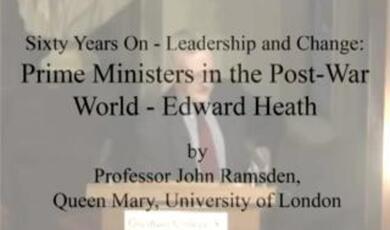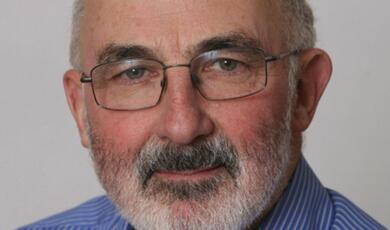Seminar: The British and American Constitutions
Share
- Details
- Transcript
- Audio
- Downloads
- Extra Reading
New York University in London jointly with Gresham College
An opportunity to discuss in depth some issues raised at the public lecture on 16 Aril 2008. This event will be aimed at academics, legal practitioners and law students.
Those attending this lecture are expected to have attended the lecture on 16 April 2008.
Download Transcript
THE BRITISH AND AMERICAN CONSTITUTIONS
Professor Vernon Bogdanor and Professor Christine
Rodriquez
(This seminar follows from the Gresham Lecture the previous evening on the British and US
Constitutions.)
Professor Vernon Bogdanor CBE, Gresham Professor of Law
We thought that one common theme that came out yesterday that links opinion and controversy
in Britain and America was whether a written constitution gives too much power to the judges,
and whether decisions previously made by elected politicians then come to be made by judges,
and whether that can be justified. It is a problem that Americans have considered for many
years, but it is also a problem that we in Britain are getting used to. Although we do not
have a constitution, we do have a Human Rights Act. Many people have argued that this does
give too much power to the judiciary. For example: terrorism protection. Members of Parliament
in the Government are elected to deal with terrorism, they are accountable, but in practice
the decisions are taken out of their hands by the judges. So we thought that was a good common
theme to discuss.
Since I began yesterday evening, I thought it was only fair to let Cristina begin today, to
look at it from the American point of view.
Professor Cristina Rodriguez, New York University
The issue of whether judges play too large a role in deciding key questions of
constitutional rights and constitutional structure is a very important part of the political
debate in the United States, and the judiciary is often seen, particularly among very vocal
elements of the political parties, as a target as well as an opportunity: a target for doing
what is known popularly as "legislating from the bench", but also an opportunity to
influence the development of very important issues.
I do not know how many people followed the presidential debates for the 2004 Election, but
I watched them obsessively. During one of the debates, George Bush invoked the name of a case
called Dred Scott v. Sandford, and started talking about the Dred Scott case and how horrible
it was. Everyone in the room was perplexed because Dred Scott was a case in which the Supreme
Court in the late 1850s essentially decided that slaves were not people and therefore the
person who are brought suit to try to sue for this freedom was not authorised to file suit.
There is no dispute about the abhorrence of that decision any more, so it was odd that he
would have invoked that in a debate, but it turns out that he was actually speaking in coded
language to elements of the base of the Republican Party, not about the slavery issue, which
has long since been settled, but about the question of abortion and abortion rights. Invoking
Dred Scott, which is a case where the Supreme Court intervened in a major political dispute of
the day, which was the dispute over whether slavery could translate to the Western
territories, has been appropriated by members of the Right To Life Movement as a symbol of the
judiciary run amok, just like Roe v. Wade, a decision where the judiciary has been seen to run
amok.
The reason it is a case and an issue that is both of relevance in the general political
debate and the way that people understand the proper role of judges, but also for
constitutional law scholars and people interested in the development of the court as an
institution, is because it taps into one of the debates that I invoked last night, and that is
whether or not the Constitution, which is written, protects rights that are not themselves
enumerated in the Constitution. It has been a debate that has been present since before the
Bill of Rights was even adopted in 1791 and one that persists today. Today, the debate
revolves primarily around the issue of abortion and related freedoms. So the reason why it
provokes so much controversy about the role of the judiciary in the development of legal
discourse is because the right to an abortion, or the right to privacy, the umbrella right
under which the abortion issue is protected or framed, is a right that has developed as the
result of judges essentially interpreting a provision of the Constitution that says nothing
about protecting privacy interests.
The issue was originally initiated in the 1960s surrounding a case involving contraception
and access to contraception. There were two states in the United States in the early '60s that
still prohibited the sale of contraception - Massachusetts and Connecticut - and so there was
a challenge to the law in the state of Connecticut, and those were two states where the
Catholic Church still had a great deal of political power and was in large measure responsible
for the continued prohibition on the sale of contraception.
When it reached the court, if you read the Constitution, there is no right that protects
procreative freedom or contraception or anything related, but there is a clause that protects
the rights to life, liberty and property, with due process of law. In other words, the
government is prohibited from depriving people of life, liberty or property without due
process of law. So the justices, when faced with this question about whether or not a state
could ban the sale of contraception, something that was seen as not an arbitrary act by the
state but one that certainly interfered with important interests that people had, they were
faced with how to adapt the existing Constitution, which did not clearly protect that interest
or that right, to respond to the needs. There were several different strategies that the court
initiated, each of which, in a different way, demonstrated how courts, when trying to
interpret a written constitution, can actually seem to begin to get out of control.
The strategy adopted by Justice Douglas, who is known as a bit of a "cookie
Justice", was to look at the Constitution as a whole and to look at the rights that were
in fact enumerated: the right to freedom of speech; the right to freedom from unreasonable
searches and seizures; the right not to have troops quartered in one's home, which is not
really a threat any more (though when the Constitution was written, the British Army in
particularly would routinely quarter troops in people's homes, and that was one of the
grievances of the people who broke away). What he identified was, around each of those rights
that were explicitly enumerated, penumbras, or you might call them shadows, that extended
beyond the actual rights that were enumerated. Those shadows, to him, embodied a basic idea of
privacy, a basic idea of freedom from arbitrary government imposition in the privacy of one's
home. He interpreted those penumbras as covering the interest in being able to access
contraception. So that was one way in which the court adapted a constitution that did not
specially address the issue of access to contraception.
Others of the Justices in that same case referred to the liberty, the reference to liberty
that I mentioned in the due process clause of one of the amendments of the Constitution, and
found that the traditional concept of ordered liberty included the protection of certain
privacy-like interests. They did not quite invoke the word "privacy", but the idea
of ordered liberty was something that could be extended to protect the interest in access to
contraception.
You can imagine that that idea of ordered liberty is a very malleable concept, and over
time, that notion of liberty in the private sphere has been extended, not just to apply to
contraception, which was a relatively uncontroversial case at the time, but to extend also to
access to something like abortion, to extend to protect the interest in procreative freedom.
So you had what was a series of creative interpretations by different Justices on the court
eventually evolve into a doctrine that protected things that were politically extraordinarily
controversial. In the early 1970s, this right was extended to cover access to an abortion, and
in the context of doing that, the court created a system that basically legislated when an
abortion was permissible, or when a restriction was permissible and when it was not. It
intervened into a political debate that was brewing, or that had been brewing, in the United
States for a number of years, and attempted to settle the issue, basically telling states that
they could not restrict access to an abortion, despite the strong popular consensus in some
parts of the country that that was something that could in fact be restricted.
There you have the perception of a court intervening in an instance of great political
dispute to say that this political debate was off-limits; it was not a debate that people
could have because there was a fundamental right that was being infringed and could not be
infringed.
The effects of that are with us still today in our politics in many ways. The existence of
the right itself has been updated over time to apply to - and this is a case I invoked
yesterday as well - to strike down prohibitions on homosexual sodomy. It has also been applied
to protect familial interests and privacy. It has not been extended in other types of cases to
protect the right to physician-assisted suicide, but you can see it is a right - that concept
of procreative freedom, freedom to control one's personal life, freedom in the home - that can
be expanded or contracted depending on the points of view of the people who are trying to
apply it, and the people trying to apply it are unelected judges.
In that way, the debate is with us, as constitutional scholars and as constitutional
lawyers, but there are many people who, from a political perspective, also emphasise things
like George Bush's invocation of the Dred Scott decision during the debate as a code to his
base, and abortion politics in particular, in large measure due to the judiciary, has affected
the electoral patterns in the United States in pretty profound ways.
There are some who would argue, and I am not sure I would go this far because I have not
myself done the historical research, but that that series of decisions has had a major role in
producing the ascendancy of the Republican Party in the United States and the ascendancy of
the religious right as a powerful political force in the United States. There are some
liberals, at this stage, who are even willing to say let's overrule Roe v. Wade, even though
it is understood to protect this very basic freedom that is defended by lots of different
people for different reasons on the left; let's overrule it, and remove from the debate this
idea that unelected judges are solving some of our most contentious political
problems.
That is just one example of how the judiciary, in interpreting a written Constitution, but
doing it in a way that actually moves beyond the written text, but with an authority that
comes from the written text, has injected itself into a political debate and become, in a way,
a political actor, which we do not expect the judiciary to be.
Professor Vernon Bogdanor CBE
Are we getting the same problem of judges overturning the will of Parliament? One has to
remember that judges are not elected, not accountable.
The Human Rights Act in this country is rather different from the American Constitution
because it does not give the judges the power to strike down Acts of Parliament. All that
judges can do is issue a declaration of incompatibility, a statement, saying that, in their
opinion, a statute or part of a statute goes against the European Convention of Human Rights,
and it is then for Government and Parliament to decide what to do about it. There is a special
fast-track procedure by which the law can be altered if Parliament so wishes; so far, there
have been about 20 declarations of incompatibility since the Human Rights Act and, so far, the
Government has put things right on every occasion. Of course, there is no guarantee they will
in the future.
What the Human Rights Act tries to do is to pose an ingenious compromise between two
conflicting doctrines: the sovereignty of Parliament and the rule of law. You can see that
these could come into conflict because, in theory, Parliament could do something that went
against the rule of law. The Human Rights Act tries to preserve both doctrines. I once asked a
senior judge what would happen if there was a conflict between these two doctrines, the
sovereignty of Parliament and the rule of law, and he replied, "That is a question that
ought not to be asked," because, in a very British way, we try to avoid what could be a
theoretical conflict.
The burden of human rights has really been transferred to the judges, and it is fair to say
many human rights cases do involve the rights of very small minorities. That is not true of
issues like contraception and abortion, which Cristina discussed, but there are some cases
where the Supreme Court has been concerned with the rights of very small minorities like
Jehovah's Witnesses or members of the Communist Party. We have got these problems in Britain
with small minorities - asylum seekers, prisoners, suspected terrorists and so on, people who
perhaps would not get much support in elections amongst politicians standing for elections. As
I said yesterday, life would be much simpler if the victims of injustice were always
attractive characters or nice people like ourselves, but they are often not. I think the
system is quite good at giving justice for people like ourselves but perhaps not for people
who are not quite so nice.
This compromise works, presumably, on the basis that the judges exercise some degree of
self-restraint, and, as Cristina said yesterday, that has been true in America since the late
1930s, because some people said that under Roosevelt's very radical Administration in the
1930s that judges went too far in trying to overturn decisions made by the elected President
and Congress to deal with the Depression. Since 1937, the judges have, on the whole, adopted a
doctrine of judicial self-restraint in America and they are very careful about striking down
federal statutes. I think most of the statutes they have struck down have been state statutes
and not federal ones. Our judges too, if the Human Rights Act is going to work, have to show
some degree of self-restraint, some degree of deference to what Parliament has
decided.
They did that recently when asked about the hunting decision. Some people said the decision
to ban hunting went against the Human Rights Act. The judges said, well, we're not really
going to consider that because it has been an issue, it has discussed in elections, it is a
political issue, and it is for the parties and Parliament to sort it out - not something that
judges ought to decide. So self-restraint by the judges, but also of course self-restraint by
Ministers and MPs in not going too far in terms of the abrogation of human rights.
Nevertheless there is a likelihood of a conflict, and I think that conflict has already come
about.
Looking at it from an historical perspective, I think it has come about much more rapidly
than conflicts in America, because in America, the Dred Scott case, which Cristina mentioned,
was in 1857, which was 70 years after the Constitution, and you did not really get a conflict
with the Supreme Court for 70 years. But we have had these conflicts - the Human Rights Act
has only been in operation since the year 2000, and already there have been very considerable
conflicts. It is interesting that former Prime Minister Tony Blair, suggested, in 2006, that
there should be legislation limiting the role of the courts in human rights cases, amending
the Act, and he was very angered by a decision about Afghan hijackers. The then Prime
Minister's comments were supported by the leader of the Opposition, David Cameron, and he
renewed a pledge that was in the Conservative Party's 2005 Election Manifesto to, and I quote,
"reform or, failing that, scrap the Human Rights Act." So it has already a subject
of controversy, much more rapidly than the role of the Supreme Court became a subject of
controversy, and we have had very radical implications.
The reason for this is that the Act assumed, what I think was reasonable to assume perhaps
in the year 2000, that there was a broad consensus between the judges and Parliament on what
human rights were, and that any breaches of human rights would be inadvertent by the
Government and unintended, and so there would not be much disagreement between the Government
and the judges about putting things right: they would be things that Government had not
noticed. But there is not a consensus on the rights of unpopular minorities, and since 2000,
by a bit of bad luck from the point of view of the Act, two problems have arisen which really
have caused a great deal of conflict.
The first is that of asylum seekers. Asylum is, in a sense, an old problem, immigration,
but it has grown in significance since the year 2000, since the Human Rights Act was passed,
and it is a very emotive issue, and politicians think they could lose votes if they do not
take strong measures against asylum seekers, so it has been a much more important issue since
2000 than perhaps people could have predicted at the time.
The second issue which has come to the fore, sadly enough, is also terrorism, which has led
to these conflicts between the judges and Government. Now, we were used to terrorism, in a
way, before 2000, but it was a kind of old-fashioned sort of terrorism, if you like: that of
the IRA. The IRA had a specific, concrete aim, which was the re-unification of Ireland. The
kind of global terrorism we have had since 9/11 is rather different because it has very wide,
if not unlimited, aims - perhaps the establishment of an Islamic empire - and apparently has
terrorist cells in a huge range of countries. So the Government says, to deal with that new
form of terrorism, we need new methods that may well infringe human rights. This has led
to a conflict on issues like detention without trial, control orders, and all the rest of
it.
The judges are beginning to go a bit further in their comments, and these are comments that
are obita dicta, that is, they are not part of a judgement but they are made in comment on a
judgement. The House of Lords is soon to become our Supreme Court, very similar to the
American Supreme Court in the sense it is the top layer of the judiciary, though, as I say, it
does not have the right to strike down legislation. In one of the cases about hunting, a Law
Lord, Lord Steyn said that the sovereignty of parliament was "but a construct of the
common law". He said, "The judges created this principle. If that is so, it is not
unthinkable that circumstances could arise when the courts have to qualify a principle
established on a different hypothesis of constitutionalism." He was bringing out into the
open this clash between the sovereignty of Parliament and the rule of law.
He went on to say: "In exceptional circumstances involving an attempt to abolish
judicial review or the ordinary role of the courts, the courts may have to consider whether
this is a constitutional fundamental which even a sovereign Parliament acting at the behest of
a complaisant House of Commons cannot abolish." This relates to a very interesting
attempt by the Government to deny access to the courts, because in 2004 the Government was
drafting new legislation about asylum, and they offered no right of appeal from a decision of
the Immigration Tribunal to the courts. In other words, if the Tribunal said that you could
not stay in the country, you had to be deported, there was no appeal to the ordinary courts
from that Tribunal. This makes a nonsense of the Human Rights Act, because if you have no
access to the courts, the Human Rights Act is worthless from your point of view. The
Government removed that clause after there were a lot of protests, but the interesting
question arises, if this had gone to the statute books, would the courts have ignored it and
said, well, everyone must have a right to the courts - it is a basic right, whatever
Parliament says?
Lady Hale, who is another Law Lord, the only female on the Supreme Court, said, in that
same case (the hunting case) another obita dictum: "The courts will treat with particular
suspicion, and might even reject, any attempt to subvert the rule of law by removing
Government action affecting the rights of the individual from all judicial powers."
A third Law Lord went further, Lord Hope of Craighead, a Scottish Law Lord - that may be
significant. He said, "Parliament sovereignty is no longer, if ever it was, absolute. It
is not uncontrolled. It is no longer right to say that its freedom to legislate admits of no
qualification whatever. Step by step, gradually but surely, the English principle [he said
"the English principle", not the Scottish] - the English principle of the absolute
legislative sovereignty of Parliament is being qualified." He then said: "The rule
of law enforced by the courts is the ultimate controlling factor on which our constitution is
based." Here, again, he is taking this conflict by the horns, as it were, and saying
Parliament is no longer sovereign, it is the rule of law. You cannot I think say, as he does,
that Parliamentary sovereignty is being qualified, no longer uncontrolled. Parliament
sovereignty either exists or it does not. It is like virginity: you cannot be a partial
virgin; you either are or you are not, and I think Parliamentary sovereignty is the same.
What these judges are saying is that the sovereignty of Parliament is a doctrine which the
judges created and which they can now supersede. I think what we are having really in Britain
is a conflict, a conflict which the Human Rights Act tries to muffle, but it is being brought
out into the open, this conflict between Parliamentary sovereignty, the two constitutional
principles, the Parliamentary sovereignty and the rule of law.
It seems to me that this is going to lead us to a constitutional crisis, and what I mean by
a constitutional crisis is not merely there is disagreement, because that you expect in a
democracy - people disagree about human rights or asylum or whatever it is - but what I mean
by a constitutional crisis is a profound difference of view about how the disagreement should
be settled.
One group of people say, the Government and MPs and I suspect a lot of the press and
public, that they are elected and it is for them to weigh the balance between the rights of
individuals and the needs of society, that they are accountable to the people, to us, for what
they do, and that the Human Rights Act provides for judges to review legislation, but this
should not be an excuse for the judges to seek judicial supremacy; and if the judges want
judicial supremacy, they should make that case publicly and seek the explicit approval of
Parliament and the people, that they should not try to expand their role by stealth, though
you may say the American Supreme Court has expanded its role by stealth.
The senior judges would reply that they have a special role, which the Human Rights Act
gave them, in protecting the rights of unpopular minorities, such as asylum seekers and
suspected terrorists.
Because they are disagreeing about these issues, each group is tending to say the other has
broken the constitution, because judges say the Government is infringing human rights and then
attacking the judiciary for doing its job and putting things right, and the Government and
Parliament say judges are usurping power and seeking to thwart the will of Parliament. So the
constitution is coming to mean different things to different people, and the argument from
parliamentary sovereignty points in one direction, and the argument from the rule of law
points in another.
If you say Parliament is sovereign, then Parliament, in the last resort, can refuse to take
notice of a declaration of incompatibility. If you say that the Human Rights Act trumps it,
then you say Parliament is no longer sovereign. It seems to me that we are in a transitional
period. If you say Parliament is no longer sovereign, you become a constitutional state, no
longer a state governed by Parliamentary sovereignty but a constitutional state I think
we are in a transitional period towards one of these conclusions; we are in a slightly messy
state, and it is probably a painful process before we reach some new sort of constitutional
settlement. Obviously, one cannot predict what that will be. I think the American film
producer, Sam Goldwyn, once said, "I never make predictions, especially about the
future," so I'll stop at that point!
©Professor Vernon Bogdanor, Gresham College, 17 April 2008
©Professor Christine Rodriquez, Gresham College, 17 April 2008
This event was on Thu, 17 Apr 2008
Support Gresham
Gresham College has offered an outstanding education to the public free of charge for over 400 years. Today, Gresham plays an important role in fostering a love of learning and a greater understanding of ourselves and the world around us. Your donation will help to widen our reach and to broaden our audience, allowing more people to benefit from a high-quality education from some of the brightest minds.


 Login
Login








